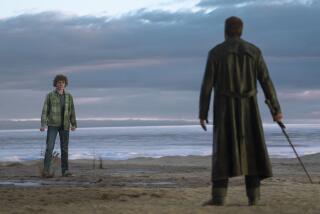The Last Gentleman : THE HOUSE OF PERCY: Honor, Imagination, and Melancholy in a Southern Family, <i> By Bertram Wyatt-Brown (Oxford University Press: $30; 454 pp.)</i>
- Share via
In an essay called “Stoicism in the South” the novelist Walker Percy observed: “The greatness of the South . . . had always a stronger Greek flavor than it ever had a Christian.” So it is no surprise that in “The Moviegoer,” Percy’s award-winning 1961 novel, the patrician aunt sends her somewhat unmoored nephew a stern memo quoting the Stoic philosopher and emperor Marcus Aurelius, not St. Paul or New Orleans’ Archbishop Rummel. Indeed, one generation after another of the eminent Percy family turned to Marcus Aurelius for solace and support.
Stoicism helps explain not only the South’s historic emphasis on manners--suitable behavior and appearance were hallmarks of this pagan philosophy--but also on a code of honor. As Bertram Wyatt-Brown, Richard J. Milbauer Professor of History at the University of Florida, points out in his meticulously researched study of Walker Percy’s family, the story of honor is here entwined with melancholy--or in more clinical terms, chronic depression. How various members of this gifted family--several were poets and novelists--tried to cope with the demands of honor and the trials of melancholy through the use and misuse of imagination is treated with singular tact and wisdom in Prof. Wyatt-Brown’s absolutely riveting history.
Although the book ranges as far back as the early 16th Century with an account of an earl’s suicide in the Tower of London and does full justice to antebellum days both in the South and Philadelphia, it is in the chapters on William Alexander Percy (1885-1942) that the abundant historical detail lavished on the reader comes into sharp focus.
After Walker Percy’s father committed suicide, “Uncle Will” Percy--actually, he was the novelist’s first cousin once removed--acted as surrogate father for Walker and his two brothers. Long before bringing the boys into his roomy bachelor’s home in Greenville, Miss., Will Percy had replaced the pious fervor of his childhood Catholicism with a resigned Stoicism. As Wyatt-Brown speculates, “Will’s loss of faith in Christianity, and particularly in Catholicism, had much to do with his shame at his own sexual feelings. . . .”
Practicing law only out of a grim sense of family duty, Will Percy found his true calling in writing poetry. These poems, Wyatt-Brown comments, might have been a way for Will to cope with the conflicting emotions aroused by his greatly inhibited homosexuality. Though this somewhat reductionist view of the creative impulse might give some readers pause, Wyatt-Brown also notes how the poet’s complex stance toward his father echoed a paternal theme in the poetry of Will’s great-aunt, Eleanor Percy Lee. Indeed, throughout the book Wyatt-Brown points out similarities in the creative works of Percy family members from disparate generations. “The complicated account of these themes,” Wyatt-Brown writes, “may help to explain how families, consciously and sometimes unconsciously, recapitulate old issues in new settings. . . .”
One issue that confronted every generation of Percys was race. Will Percy’s father, Sen. LeRoy Percy, fought a courageous battle against the Ku Klux Klan that earned him nationwide attention. Although ideals of human dignity and a hatred of cruelty undoubtedly inspired him, Will’s father based his appeal to fellow white landowners in Mississippi on simple economics. Already many blacks had left the Delta in search of better wages in Northern industries. “With only three parades,” LeRoy Percy warned, “no matter how peaceful, the Klan could sweep all the remaining blacks out of the region. . . .” There would be no laborers to harvest the crops.
In the Percys’ bitter struggle with the Klan, Wyatt-Brown doesn’t ignore the class resentment that surfaced. LeRoy Percy railed that they were “a cowardly, skulky bunch and no thoroughbred ought to have anything but a feeling of contempt for them.” A true patrician who defied the teetotaling self-righteousness of the Klan by openly drinking bootlegged liquor and gambling, LeRoy Percy passed on to his son a paternalistic attitude not only toward African-Americans but also toward lower- and middle-class whites.
As a result, when Will Percy wrote his memoir, “Lanterns on the Levee,” still in print today after its 1941 publication, little if any mention is made of ordinary citizens. “(B)lack or white,” Wyatt-Brown notes, “the people outside the family circle--unless enemies like Bilbo or dependents like Lige--were simply invisible.” Yet rather than pass a simple judgment on Will Percy for his blatant prejudices, Wyatt-Brown patiently uncovers the deeper humanity of this anguished, lonely intellectual. Hodding Carter, whose editorials against racism in the Greenville paper won him the 1946 Pulitzer Prize, had this to say about the man who was largely responsible for hiring him away from a small Louisiana paper: “(Will Percy) sent penniless youngsters to college, helped jobless men find work, set up ambitious people in small businesses.” Some African Americans even referred to him as the “little Jesus.”
Will Percy’s kindness, unusual in a plantation owner of that time, calls to mind the story of his great-grandfather, Thomas George Percy. By cross-referencing generations in regard to such character traits, Wyatt-Brown’s portraits resonate at time with an almost uncanny perspective. By all accounts Thomas George Percy should have been plagued with the same ambition and depression that afflicted so many other family members. Indeed, his own father had committed suicide and his sister was hospitalized for melancholia. Yet in those antebellum days Thomas George managed to cultivate a quiet happiness, mainly by nurturing devoted friendships.
The deep platonic bond between Thomas George and a Princeton classmate who contracted tuberculosis would be echoed in later years by other Percy friendships based on shared intellectual interests. Perhaps the most fascinating connection of this sort was not between two Percy men, but that between a female descendant, Sarah Ellis Dorsey (1829-1879), and the ex-president of the Confederacy, Jefferson Davis.
A novelist and biographer, Sarah Dorsey found strength in the meditations of Marcus Aurelius during the trials of the Civil War. Although she was “by far the most personally involved in the improvement of black life of all the Percy connections . . . until . . . Will Percy’s day,” the terrible fact remains that she, like other antebellum Percys, was a slaveholder.
Toward the end of her life Sarah Dorsey invited the married Jefferson Davis to live in a cottage on the grounds of her Mississippi home so that she could help encourage him to finish writing his memoirs. Wyatt-Brown’s thoroughly engrossing account of how this proto-feminist and yet still proper Southern lady wound up giving all of her money away to the ex-President--who was never her lover, despite endless gossip--is a fitting conclusion to the chapters on the remarkably accomplished females in the Percy line.
This wealth of family background helps shed a new light on Walker Percy as the book draws to a close with an overview of the novelist’s life and work. Tentatively, Wyatt-Brown probes a link between Percy’s last novel, “The Thanatos Syndrome,” and Sarah Dorsey’s 1864 novel, “Agnes Graham.” Even more striking plot elements are shared in Percy’s “Lancelot” and an 1860 best-selling novel by a Percy cousin, Catherine Warfield. Considered Percy’s masterpiece by Wyatt-Brown, “Lancelot” explores the tension between the family’s age-old Stoic ideals of honor and the selfless demands of Percy’s Christian faith.
In his 1956 essay on stoicism Walker Percy wrote, “Its most characteristic mood was a poetic pessimism which took a grim satisfaction in the dissolution of its values--because social decay confirmed one in his original choice of the wintry kingdom of self.” For this last gentleman, though, self was no longer sufficient. A different choice was made.
More to Read
Sign up for our Book Club newsletter
Get the latest news, events and more from the Los Angeles Times Book Club, and help us get L.A. reading and talking.
You may occasionally receive promotional content from the Los Angeles Times.










